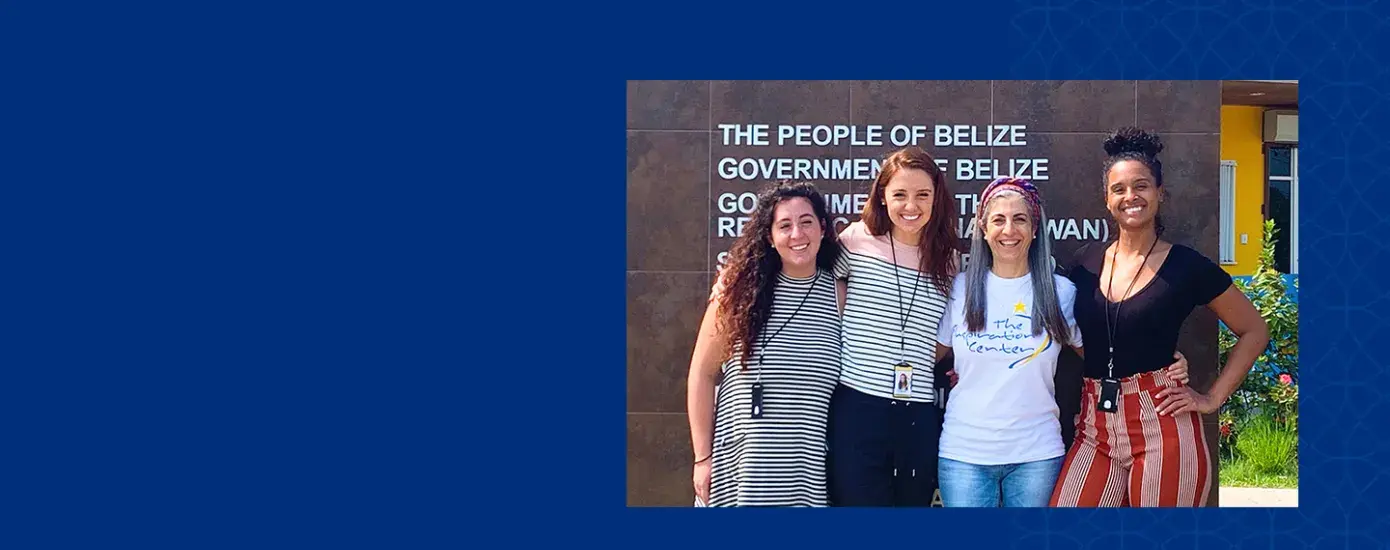
My parents immigrated to the United States from Belize in their early twenties in search of better opportunities and a bright future for their children. Although my brother and I were born and raised in the United States, we have spent many summers visiting family, so our hearts have always been in Belize. Thus, I was both happy and anxious when I returned there this spring with two of my fellow speech-language pathology classmates, Karli Miroglotta and Rachel Kowalski, to volunteer at the Inspiration Center.
I was a bit nervous bringing two Americans with me to Belize. I didn’t know how they would handle the heat (never under 85 degrees the entire trip), the food, or the culture. I didn’t want them to have a bad experience in the country I love so much. I also was nervous to be a tour guide in a place I’ve never lived. Plus, I was well aware of my privilege of being Belizean American; because I don’t have the same experiences nor education as Belizeans my age, I didn’t want to act like I knew everything about the country.
The Inspiration Center is a non-governmental organization in the capital of Belize City that provides various therapy and health services to children with disabilities and their families. On our first day, the staff gave us an overview on the different cultural groups they serve. That came in handy when we traveled to the town of San Ignacio in the Cayo district to see patients in a mobile clinic. It’s sad the mobile clinic team can see people only about once a year since resources are limited and there are far too many families needing assistance.
Although English is the country’s official language, Spanish is primarily spoken in that area. Our rudimentary Spanish made it challenging to understand the kids we evaluated because we didn’t know the vocabulary for clinical terms. But we focused more on parent education and resources to be practiced at home. One child we saw could only drink from a bottle since he chokes a little when drinking and eating. Our guide, Marcela Lutthans—the only SLP in the entire country—asked us to diagnose him. After evaluating his range of motion and strength and watching him drink and chew, we gave his mother handouts on how to do strengthening exercises with him at home.
Even though our session with that patient went well, we were insecure and critical about our sessions. We felt like we could have done more, such as given patients better resources. If our Spanish had been a little better, we could have made evaluations a little more fun. It helped to hear from Marcela Lutthans that the clinic was able to see twice as many kids during our 10-day trip thanks to our visit.
When we looked back at our notes and summarized our patients, we realized we actually did a good job. Yes, we were harsh on ourselves and expected perfection—but in the real world, no session will be perfect. There’s always the chance of a language barrier or a kid who’s a challenge, but as long as we try our hardest to provide the best services, that can be enough.
This trip was an experience that changed our clinical decision making and allowed us to think deeply about our services as SLPs as we begin our new careers. It provided us a unique opportunity to study our privilege and how it affects the people we serve. We will remember the sessions where we were too hard on ourselves and also remember our due diligence to provide evidence-based services. Volunteering at the Inspiration Center taught us to not tolerate differences but to celebrate and learn from them.
Alyssa Savery graduated in May with a Master of Science in Speech-Language Pathology. She is working for Easterseals of Massachusetts in its assistive technology department.
